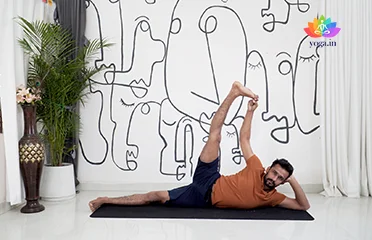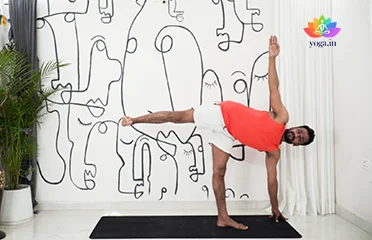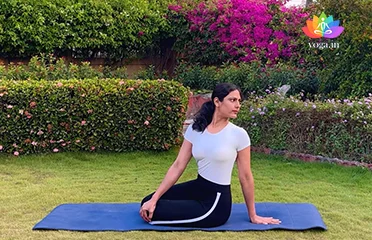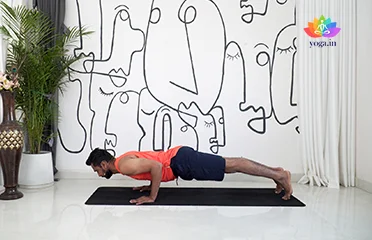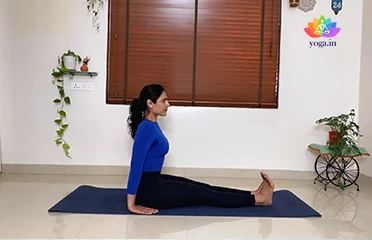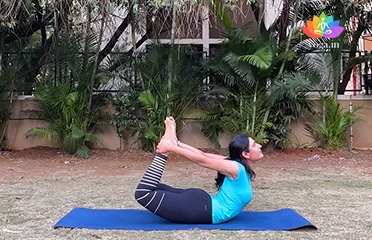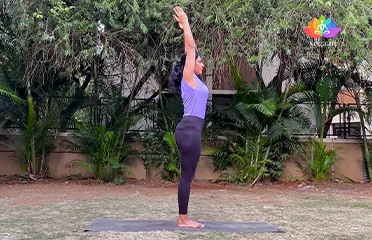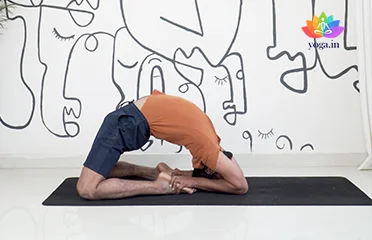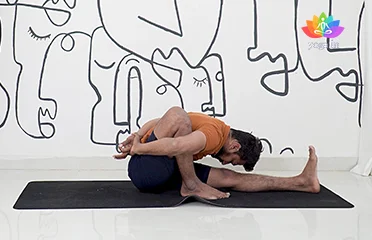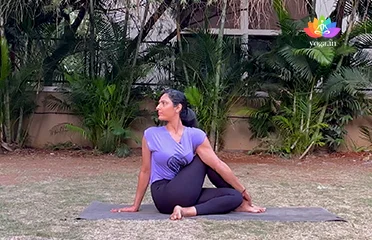Anantasana (Sleeping Vishnu Pose)
अनन्तासन / Sleeping Vishnu Pose | Vishnu's Couch Pose
The Sanskrit name is derived from Ananta (अनन्त) meaning without end [�K]
Ardha Chandrasana (Half Moon Pose)
अर्धचन्द्रासना / Half Moon Pose
The Sanskrit name is derived from Ardha (अर्ध) meaning half, Chandra [�K]
Bharadvajasana (Seated Spinal Twist)
भरद्वाजसन / Seated Spinal Twist
The Sanskrit name is derived from Bhardvaja (भरद्वाज) means bringing [�K]
Chaturanga Dandasana (Low Plank Pose)
चतुरङ्ग दण्डासन / Low Plank Pose
The Sanskrit name is derived from Chatur (चतुर) meaning four, Anga (अङ्ग) [�K]
Dandasana (Stick Pose)
दण्डासन / Stick Pose
The Sanskrit name is derived from Danda (दण्डा) meaning stick and [�K]
Dhanurasana (Bow Pose)
धनुरासन / Bow Pose
The Sanskrit name is derived from Dhanur (धनुर) means bow and Asana [�K]
Hastapadasana (Hand to Foot Pose)
हस्तपदासन / Hand to Foot Pose
The sanskrit name is derived from hasta (हस्त) means hands, pada (पदा) [�K]
Kapotasana (Pigeon Pose)
कपोटासन / Pigeon Pose
The Sanskrit name is derived from Kapota (कपोटा) meaning pigeon or [�K]
Marichyasana (Sage Twist Pose)
मरीच्यासन / Sage Twist Pose
The Sanskrit name is derived from Marichya (मरीच्) meaning ray of [�K]
Matsyendrasana (Lord of the Fishes Pose)
मत्स्येन्द्रासन / Lord of the Fishes Pose
The name Matsyendrasana is derived from the Sanskrit words Matsya (मत्स्य) [�K]
- 1
- 2
- 3
Learn Yoga for arthritis of the lower back
Arthritis of the lower back, a common condition, can cause pain, stiffness, and limited mobility. Yoga offers a natural approach to manage these symptoms and improve overall well-being. Gentle yoga poses (asanas), breathing exercises (pranayama), and relaxation techniques can promote flexibility, strengthen core muscles, and reduce inflammation, all contributing to pain relief and improved function in the lower back.
Understanding Lower Back Arthritis
Lower back arthritis refers to the inflammation and degeneration of joints in the lower spine. There are different types of arthritis, with osteoarthritis (wear-and-tear) being the most common. Symptoms can include lower back pain, stiffness, especially in the morning, and difficulty bending or twisting.
Yoga’s Benefits for Lower Back Arthritis
- Pain Relief: Gentle yoga stretches and movements can improve circulation and blood flow to the lower back, promoting healing and reducing pain perception.
- Improved Flexibility: Yoga poses target muscles around the spine and hips, increasing flexibility and range of motion in the lower back.
- Strengthened Core: A strong core stabilizes the spine, reducing stress on the lower back and improving posture. Yoga poses engage core muscles, providing them with a gentle workout.
- Reduced Inflammation: Certain yoga poses can promote lymphatic drainage, which may help reduce inflammation in the lower back.
- Stress Management: Chronic pain can be worsened by stress. Yoga’s focus on breath and mindful movement promotes relaxation, which can help manage stress and its impact on pain.
Yoga Asanas for Lower Back Arthritis
- Marjariasana (Cat-Cow Pose): This gentle spine mobilization exercise warms up the back and improves flexibility.
- Adho Mukha Svanasana (Downward-Facing Dog Pose): This invigorating pose stretches and strengthens the entire back, hamstrings, and shoulders, improving posture and flexibility. It can be modified with blocks or pillows under the hands for support.
- Balasana (Child’s Pose): This restorative pose provides a gentle stretch to the lower back and promotes relaxation.
- Supta Matsyendrasana (Supine Spinal Twist): This gentle twist stretches the muscles along the spine and hips, improving flexibility and reducing stiffness.
- Savasana (Corpse Pose): This final resting pose allows for deep relaxation and integration of the yoga practice’s benefits.
Pranayama for Lower Back Arthritis
- Ujjayi (Victorious Breath): This calming breath technique focuses the mind and promotes relaxation, which can be helpful in managing pain.
- Nadi Shodhana (Alternate Nostril Breathing): This balancing breath technique reduces stress and promotes relaxation.
Diet for Lower Back Arthritis
- Focus on Anti-inflammatory Foods: Include fruits, vegetables, and fatty fish in your diet. These foods are rich in antioxidants and omega-3 fatty acids, which can help reduce inflammation and promote healing.
- Maintain a Healthy Weight: Excess weight puts additional strain on the lower back. Maintaining a healthy weight through a balanced diet and exercise can help alleviate back pain.
- Stay Hydrated: Drinking plenty of water is crucial for overall health and can help keep your spine discs hydrated, which is important for proper back function.
Cautions for Lower Back Arthritis and Yoga
- Listen to Your Body: Avoid pushing yourself into pain. Modify poses as needed and take breaks when necessary. It’s important to prioritize comfort and safety during your practice.
- Seek Guidance: It’s important to learn yoga poses under the guidance of a qualified instructor who can ensure proper alignment and provide modifications for lower back arthritis.
- Start Slowly: Begin with gentle yoga poses and gradually increase the intensity as your flexibility and strength improve.
- Communicate Limitations: Inform your yoga instructor about any limitations or injuries you have in your lower back.
Contraindications
- Severe Spinal Conditions: People with severe spinal stenosis, herniated discs, or other serious spinal conditions should avoid yoga or consult a healthcare professional and yoga therapist before practicing.
- Recent Back Injuries: If you have a recent back injury, it’s important to allow proper healing time before starting yoga.


